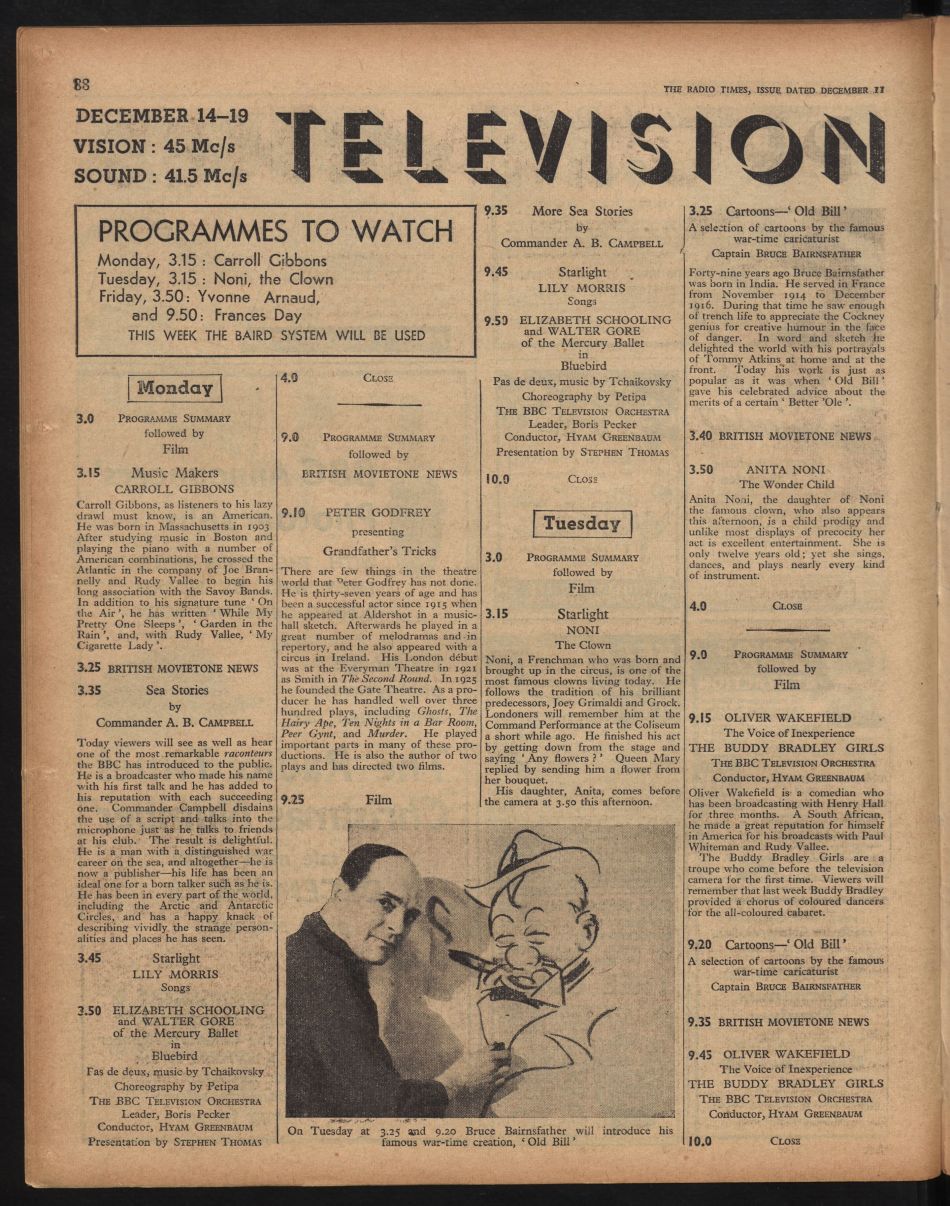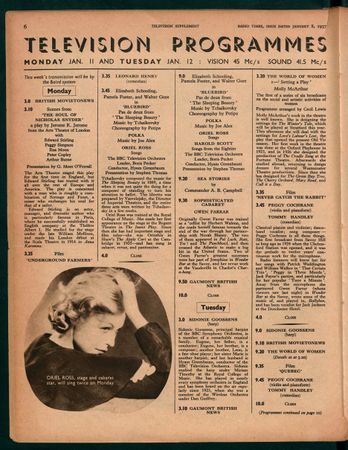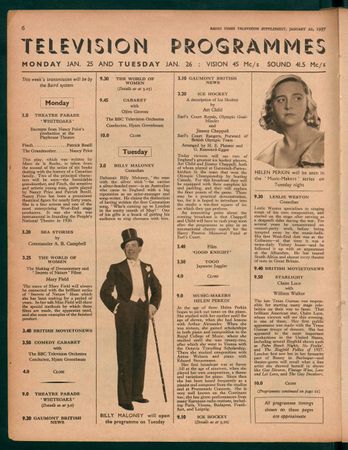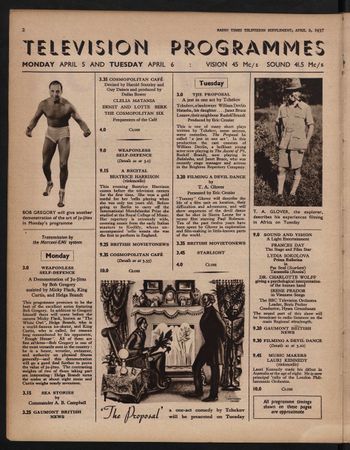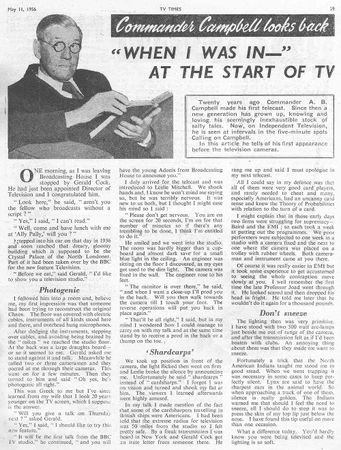Sea Stories (lost early BBC talk show; 1936-1937): Difference between revisions
No edit summary |
|||
| Line 5: | Line 5: | ||
|status=<span style="color:red;">'''Lost'''</span> | |status=<span style="color:red;">'''Lost'''</span> | ||
}} | }} | ||
'''''Sea Stories''''' is an early BBC Television Service talk show. Broadcast from late-1936 to early | '''''Sea Stories''''' is an early BBC Television Service talk show. Broadcast from late-1936 to early 1937, the premise involved Commander A.B. Campbell detailing locations and people who he encountered during his time on the waters, including as a Naval Officer. The first episode would also provide history by being the first talk broadcast from the BBC Television Studio. | ||
==Background== | ==Background== | ||
Commander A.B. Campbell served in the Royal Navy during the First World War. He most notably was a paymaster-commander on HMS Otranto,<ref>[https:// | Commander A.B. Campbell served in the Royal Navy during the First World War. He most notably was a paymaster-commander on HMS Otranto,<ref>[https://goodreads.com/author/show/8555315.A_B_Campbell ''Goodreads'' providing a biography of A.B. Campbell.] Retrieved 15 Sep '21</ref> which sank off the island of Islay in October 1918 following a collision with HMS Kashmir, which caused a hole to be produced on its port side. Campbell survived the disaster, which killed almost 500 people.<ref>[https://bbc.co.uk/news/uk-scotland-highlands-islands-45769900 ''BBC News'' discussing the sinking of HMS Otranto.] Retrieved 15 Sep '21</ref> After serving in the Royal Navy, Campbell became a broadcaster for the BBC in 1935, starring in radio programs, including discussing the HMS Otranto's last voyage in August 1935.<ref>[https://genome.ch.bbc.co.uk/23ec98ea946940bdba1b95b386b62b46 BBC Genome archive of ''Radio Times'' issues listing ''The Last Voyage of H.M.S. Otranto''.] Retrieved 15 Sep '21</ref> He also provided a recollection of some of his journeys at sea for the radio program ''Some Stories of the Sea'', which was broadcast on Regional Programme Scotland and Regional Programme London on July 19th, 1936.<ref>[https://genome.ch.bbc.co.uk/4d9080e5e4b3427f9b729ec9c998b145 BBC Genome archive of ''Radio Times'' issues, listing ''Some Stories of the Sea''.] Retrieved 15 Sep '21</ref> | ||
==Sea Stories== | ==Sea Stories== | ||
Following the popularity of his radio programs, Campbell was invited by Gerald Cock, who had recently become Director of Television, to the Alexandra Palace. Cock was impressed with Campbell's ability to provide compelling broadcasts without a script, which was generally the result of Campbell being illiterate. Cock requested that Campbell provide a talk for BBC's then-new Television Service, which would also become the first talk from the BBC Television Studio. Campbell readily agreed, being interested in trying out this new platform. After he arrived at the Studio, he was introduced to Leslie Mitchell, a broadcaster most famous for being the first voice heard on BBC Television.<ref>[https:// | Following the popularity of his radio programs, Campbell was invited by Gerald Cock, who had recently become Director of Television, to the Alexandra Palace. Cock was impressed with Campbell's ability to provide compelling broadcasts without a script, which was generally the result of Campbell being illiterate. Cock requested that Campbell provide a talk for BBC's then-new Television Service, which would also become the first talk from the BBC Television Studio. Campbell readily agreed, being interested in trying out this new platform. After he arrived at the Studio, he was introduced to Leslie Mitchell, a broadcaster most famous for being the first voice heard on BBC Television.<ref>[https://bbc.com/historyofthebbc/research/story-of-bbc-television/tv-as-we-know-it/ ''BBC'' article concerning Leslie Mitchell.] Retrieved 15 Sep '21</ref> | ||
Mitchell would be responsible for introducing Campbell to the viewers, who would talk about a story involving cardsharpers travelling in British ships. Mitchell accidentally said "sharpcarps", resulting in Campbell turning to his proximity and shaking his fist, not realising he was live on air. This incident made most viewers amused. Additionally, Mitchell referenced that some cardsharpers in the ships were Americans. While this statement usually would not be an issue, as broadcasts back then typically could not travel beyond 50 miles, weather effects meant that it became one of [[RCA recording of BBC Television Service (found footage of pre-Second World War BBC television broadcast; 1938)|several transmissions over BBC Television Service's early lifespan to make its way to New York]]. A New Yorker complained via letter to Cock about the mention, with Cock forcing Mitchell to apologise in the second broadcast in | Mitchell would be responsible for introducing Campbell to the viewers, who would talk about a story involving cardsharpers travelling in British ships. Mitchell accidentally said "sharpcarps", resulting in Campbell turning to his proximity and shaking his fist, not realising he was live on air. This incident made most viewers amused. Additionally, Mitchell referenced that some cardsharpers in the ships were Americans. While this statement usually would not be an issue, as broadcasts back then typically could not travel beyond 50 miles, weather effects meant that it became one of [[RCA recording of BBC Television Service (found footage of pre-Second World War BBC television broadcast; 1938)|several transmissions over BBC Television Service's early lifespan to make its way to New York]]. A New Yorker complained via letter to Cock about the mention, with Cock forcing Mitchell to apologise in the second broadcast in case a similar unusual transmission occurred.<ref>[https://transdiffusion.org/2016/11/10/when-i-was-in-at-the-start-of-tv ''Transdiffusion'' providing issue 132 of ''TV Times'', which contained Campbell's column.] Retrieved 15 Sep '21</ref> | ||
Overall, a total of five episodes were produced between 14th | Overall, a total of five episodes were produced between December 14th, 1936, and April 5th, 1937.<ref>[https://genome.ch.bbc.co.uk/ca93e6d4378a4c128f87101461712bb0 Issue 689 of ''Radio Times'' listing the first episode of ''Sea Stories''.] Retrieved 15 Sep '21</ref><ref>[https://genome.ch.bbc.co.uk/1db4e4797cf34487b89ed7c906ad73d4 Issue 689 of ''Radio Times'' listing the second episode, known as ''More Sea Stories''.] Retrieved 15 Sep '21</ref><ref>[https://genome.ch.bbc.co.uk/fe1d9215962c4c32b8d9e63ab8c31922 Issue 693 of ''Radio Times'' listing the third episode.] Retrieved 15 Sep '21</ref><ref>[https://genome.ch.bbc.co.uk/1fdf1654172044be966c51ccf25174dd Issue 695 of ''Radio Times'' listing the fourth episode.] Retrieved 15 Sep '21</ref><ref>[https://genome.ch.bbc.co.uk/7b63e1cb155e4ba887b214102d630d57 Issue 705 of ''Radio Times'' listing the fifth episode.] Retrieved 15 Sep '21</ref> The first episode was summarised by issue 689 of ''Radio Times'' by discussing how Campbell talks about his stories at sea, which could occur anywhere across the world, including in the Arctic and Antarctic Circles, and the unusual personalities and places he encountered over the years. A week after the final broadcast, Campbell would go on to present ''Cabaret Cruise'', a light entertainment programme from 1937-39, 1946, and 1949.<ref>[https://genome.ch.bbc.co.uk/23ed0aa731944450b94c3996622b5384 BBC Genome archive of ''Radio Times'' issues, listing the first episode of ''Cabaret Cruise''.] Retrieved 15 Sep '21</ref> As stated in the ''TV Times'' column, ''Sea Stories'' would contribute towards a generation being entertained by Campbell's various stories on the waters. | ||
==Availability== | ==Availability== | ||
| Line 81: | Line 81: | ||
==External Links== | ==External Links== | ||
*[https:// | *[https://imdb.com/title/tt4180450/ IMDB page for ''Sea Stories''.] | ||
*[https:// | *[https://imdb.com/name/nm0132171/?ref_=tt_ov_st IMDB page for A.B. Campbell] | ||
==References== | ==References== | ||
Latest revision as of 22:10, 6 July 2022
Sea Stories is an early BBC Television Service talk show. Broadcast from late-1936 to early 1937, the premise involved Commander A.B. Campbell detailing locations and people who he encountered during his time on the waters, including as a Naval Officer. The first episode would also provide history by being the first talk broadcast from the BBC Television Studio.
Background
Commander A.B. Campbell served in the Royal Navy during the First World War. He most notably was a paymaster-commander on HMS Otranto,[1] which sank off the island of Islay in October 1918 following a collision with HMS Kashmir, which caused a hole to be produced on its port side. Campbell survived the disaster, which killed almost 500 people.[2] After serving in the Royal Navy, Campbell became a broadcaster for the BBC in 1935, starring in radio programs, including discussing the HMS Otranto's last voyage in August 1935.[3] He also provided a recollection of some of his journeys at sea for the radio program Some Stories of the Sea, which was broadcast on Regional Programme Scotland and Regional Programme London on July 19th, 1936.[4]
Sea Stories
Following the popularity of his radio programs, Campbell was invited by Gerald Cock, who had recently become Director of Television, to the Alexandra Palace. Cock was impressed with Campbell's ability to provide compelling broadcasts without a script, which was generally the result of Campbell being illiterate. Cock requested that Campbell provide a talk for BBC's then-new Television Service, which would also become the first talk from the BBC Television Studio. Campbell readily agreed, being interested in trying out this new platform. After he arrived at the Studio, he was introduced to Leslie Mitchell, a broadcaster most famous for being the first voice heard on BBC Television.[5]
Mitchell would be responsible for introducing Campbell to the viewers, who would talk about a story involving cardsharpers travelling in British ships. Mitchell accidentally said "sharpcarps", resulting in Campbell turning to his proximity and shaking his fist, not realising he was live on air. This incident made most viewers amused. Additionally, Mitchell referenced that some cardsharpers in the ships were Americans. While this statement usually would not be an issue, as broadcasts back then typically could not travel beyond 50 miles, weather effects meant that it became one of several transmissions over BBC Television Service's early lifespan to make its way to New York. A New Yorker complained via letter to Cock about the mention, with Cock forcing Mitchell to apologise in the second broadcast in case a similar unusual transmission occurred.[6]
Overall, a total of five episodes were produced between December 14th, 1936, and April 5th, 1937.[7][8][9][10][11] The first episode was summarised by issue 689 of Radio Times by discussing how Campbell talks about his stories at sea, which could occur anywhere across the world, including in the Arctic and Antarctic Circles, and the unusual personalities and places he encountered over the years. A week after the final broadcast, Campbell would go on to present Cabaret Cruise, a light entertainment programme from 1937-39, 1946, and 1949.[12] As stated in the TV Times column, Sea Stories would contribute towards a generation being entertained by Campbell's various stories on the waters.
Availability
Like all early BBC television programs, Sea Stories was broadcast live and was not directly recorded, as there were no means of achieving this prior to the end of the Second World War.[13] Thus, all episodes of the show are now permanently missing. A few Radio Times mentions and a column by Campbell discussing his first appearance on television in issue 132 of TV Times help to preserve the show's existence.
Gallery
See Also
Early BBC Television
- Alexandra Palace's wartime television demonstrations (lost footage of private television transmissions; 1943, 1945)
- An Inspector Calls (lost television adaptation of play; 1948)
- Ann and Harold (lost early BBC drama television series; 1938)
- BBC Election Night (lost coverage of British general elections; 1950-1951)
- The Care of Your Car (lost early BBC motoring show; 1947)
- Cook's Night Out (lost early BBC cooking show; 1937)
- Craftsmen at Work (lost early BBC documentary show; 1938, 1946)
- Dish of the Month (lost early BBC cooking show; 1937)
- First Aid (lost early BBC medical show; 1937)
- Foundations of Cookery (lost early BBC cooking show; 1939)
- Marcel Boulestin television shorts (lost early BBC programs; 1937-1939)
- Masks through the Ages (lost early BBC history talk show; 1937)
- Opening of the BBC Television Service (partially found coverage of inaugural day of high-definition television service; 1936)
- The Orchestra and its Instruments (lost early BBC music talk show; 1937)
- RCA recording of BBC Television Service (found footage of pre-Second World War BBC television broadcast; 1938)
- Spelling Bee (lost early BBC game show; 1938)
- Telecrime (lost early BBC crime drama; 1938-1939; 1946)
- The Wasp's Nest (lost early BBC television adaptation of Agatha Christie short story; 1937)
- Weaponless Self-Defence (lost early ju-jitsu television program; 1936-1937)
- The World of Women (lost early BBC talk show; 1937)
Early BBC Sports Television
- 1931 Epsom Derby (lost televised footage of horse racing event; 1931)
- 1937 FA Cup Final (partially found footage of football match; 1937)
- 1937 International Imperial Trophy Race (lost footage of motor race; 1937)
- 1937 Wimbledon Championships (partially found footage of tennis tournament; 1937)
- 1938 Ashes Series (partially found footage of international test cricket match; 1938)
- 1938 FA Cup Final (partially found footage of football match; 1938)
- 1939 FA Cup Final (partially found footage of football match; 1939)
- 1947 FA Cup Final (partially found footage of football match; 1947)
- 1953 British Grand Prix (partially found footage of Formula One race; 1953)
- 1955 Scottish Cup Final (partially found footage of football match; 1955)
- Archery (lost early televised toxophily; 1937-1938)
- Arsenal 7-1 Hibernian (lost footage of charity football match; 1952)
- Arsenal vs Arsenal Reserves (lost footage of early BBC televised football match; 1937)
- Barnet 3-2 Wealdstone (lost footage of Athenian League football match; 1946)
- The Boat Race 1938 (partially found footage of rowing race; 1938)
- Catch-As-Catch-Can Wrestling (lost early BBC televised professional wrestling matches; 1938-1939; 1946-1947)
- Charlton Athletic 1-0 Blackburn Rovers (lost footage of FA Cup match; 1947)
- Darts and Shove Ha'penny (lost early BBC televised darts matches; 1936-1939)
- England 0-1 Scotland (partially found international football match; 1938)
- England 1-1 Scotland (partially found footage of international football match; 1947)
- England 16-21 Scotland (partially found footage of rugby match; 1938)
- England 3-0 France (partially found footage of international football match; 1947)
- England 3-0 Rest of Europe (partially found footage of international football match; 1938)
- Falkirk 3-2 Newcastle United (lost footage of football match; 1953)
- Horace Lindrum vs Willie Smith (lost footage of televised snooker; 1937)
- Scottish Universities 1-1 English Universities (lost footage of international football match; 1952)
- Woods and Jack (lost early televised lawn bowls; 1937; 1946)
External Links
References
- ↑ Goodreads providing a biography of A.B. Campbell. Retrieved 15 Sep '21
- ↑ BBC News discussing the sinking of HMS Otranto. Retrieved 15 Sep '21
- ↑ BBC Genome archive of Radio Times issues listing The Last Voyage of H.M.S. Otranto. Retrieved 15 Sep '21
- ↑ BBC Genome archive of Radio Times issues, listing Some Stories of the Sea. Retrieved 15 Sep '21
- ↑ BBC article concerning Leslie Mitchell. Retrieved 15 Sep '21
- ↑ Transdiffusion providing issue 132 of TV Times, which contained Campbell's column. Retrieved 15 Sep '21
- ↑ Issue 689 of Radio Times listing the first episode of Sea Stories. Retrieved 15 Sep '21
- ↑ Issue 689 of Radio Times listing the second episode, known as More Sea Stories. Retrieved 15 Sep '21
- ↑ Issue 693 of Radio Times listing the third episode. Retrieved 15 Sep '21
- ↑ Issue 695 of Radio Times listing the fourth episode. Retrieved 15 Sep '21
- ↑ Issue 705 of Radio Times listing the fifth episode. Retrieved 15 Sep '21
- ↑ BBC Genome archive of Radio Times issues, listing the first episode of Cabaret Cruise. Retrieved 15 Sep '21
- ↑ Web Archive article discussing how most pre-Second World War television is missing due to no means of directly recording television. Retrieved 15 Sep '21
